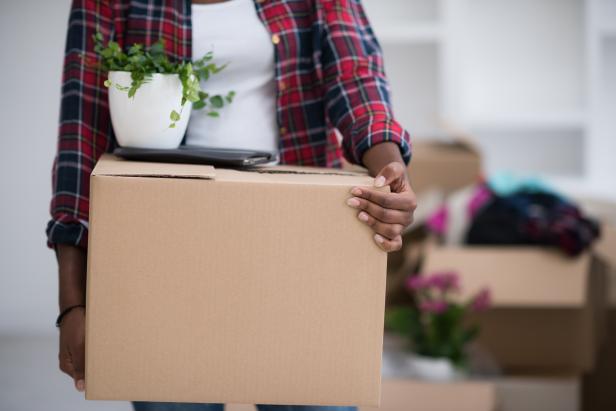Sellers: What to Do When You Can't Find a Home Before Yours Sells
If you sold your house before you've found new digs, don't worry: You have options.

In an ideal world, selling your old home and purchasing your new one would be perfectly coordinated: you sign two stacks of papers, trade one set of keys for another and voila! Unfortunately, that kind of harmonizing doesn't always happen. With both transactions pending, your future home's seller and your existing home's buyer could be trying to synchronize their own home deals. In a common enough scenario, one of your transactions is finishing before the other has even started. In this article, we will look at what to do if your home sells before you have found another, and how one popular solution to this problem can be beneficial to your buyer too.

Shutterstock/dotshock
The Seller's Perspective
If you cannot coordinate buying and selling perfectly, this is arguably the better position to be in. Buying a house before selling can make you responsible for two mortgages and two homes, sometimes in different cities. Since your sale is now complete, you know exactly what you have in the bank for house-shopping and have your down payment money ready. Plus, you are an attractive purchaser since you won't need to make your home sale a contingency in the contract.
The obvious downside to selling first is that now you need to figure out where you're going to temporarily lay your head. Based on your personal situation and the outlook for your next residence, you have a few options:
Friends and Family
If it looks like it will be a matter of a short delay, you could stay with family or friends. This option is more tenable for a single person or a couple than folks with a large family or those with young children. The advantage of shacking up with loved ones is that it may be free — a big plus. The downsides are significant, however. You will need to rent a storage unit for your stuff, and you'll incur double the time and expense of moving everything. Plus, the situation could strain your relationship if it goes on too long.
A Housesitting Gig
You could try a housesitting arrangement. Aside from your extended circle of friends, several companies online pair homeowners on sabbatical or extended work assignments with reliable home (and sometimes pet) sitters. Often it is a free arrangement, and sometimes it's even paid. That would more than make up for your storage costs. The downside to housesitting is that finding a position can take time and, depending on where you are looking, be highly competitive. If you have left the problem of where to live until the last minute or are limited in your locality, this one won't fly. It is also not an option for a family or individuals with their own pets. And you still have the moving time and expense times two.
The Short-Term Rental
Another idea is to simply rent an apartment month-to-month or on a short-term lease. This option allows you to relax and shop for your next home at your leisure without worrying about how long it might take. The financial part could be a win or loss because rent may be more or less your next mortgage payment. The definite downside is having to move twice.
The Leaseback Agreement
The best option for the home seller in this situation is often the leaseback (also known as a sale-leaseback, rent-back or post-closing possession agreement), in which you close the home sale like usual and then become the purchaser's temporary tenant for a period after closing. Your rent covers the cost of his or her mortgage payment. This scenario requires a purchaser with flexibility, but it is a common enough practice: it actually happens in about a quarter of home purchases in some markets. The great thing about the leaseback for you is obvious – you can shop for your new residence from the comfort of your former home. No shacking up with in-laws; no storage facility bills; no double moving charges.
The Buyer's Perspective
The leaseback can be of benefit to the buyer too. If the buyer is in the opposite scenario — buying before selling — a leaseback would be of serious financial benefit. Remember, carrying two mortgages is not so fun. Or, if the house was purchased as an investment property, the buyer has a built-in first tenant.
There are pre-contract buyer benefits as well. If it's a seller's market and the buyer is struggling to secure a home purchase, the seller may be too. Being amenable to a leaseback can put the buyer ahead of others competing for the home. If the buyer needs to close quickly in order to secure a low-interest rate, the leaseback offer is their carrot in negotiations. In another scenario, in which a buyer locates an off-market property or a for-sale property with a tentative homeowner, it can incentivize the homeowner to pull the trigger by slowing the transition out of the house to a comfortable pace.
Moving Day Tips: How to Pack for a Move
These 10 packing tips will help you move more efficiently and smoothly.
Doing a Leaseback Right
There are downsides to a leaseback agreement that can be avoided with cautious planning. First, not everyone is a good candidate for the arrangement. There should be a high likelihood of the seller/tenant acquiring a new residence in short order, meaning (among other things) he or she should be in a secure financial space. On the other side, the buyer/landlord should not risk jeopardizing his or her own living situation or home sale to accommodate the seller. So, those we mentioned before — an investor or someone whose old home is sitting on the market — would be good participants, as would a first-time buyer who can conveniently extend his or her current accommodation for a while longer.
Even with suitable parties, the leaseback requires careful crafting to protect everyone, particularly the buyer-cum-landlord, who carries most of the risk. The buyer should ensure at the outset that tenancy does not fall afoul of the terms of his or her mortgage agreement. And it doesn't hurt to check the local eviction laws for what the buyer/landlord's rights are in a worst-case-scenario where the seller/tenant refuses to leave. Then, an experienced real estate agent or broker should write the agreement. The leaseback needs to outline the financial obligations of the seller/tenant regarding rent and security deposit and have a fixed term with a daily fee for remaining beyond that period. It should also cover such matters as insurance coverage, whether pets are allowed, and responsibility for utilities, maintenance and repairs.
So much of the home-selling and home-buying experience is out of one's control — with the other party and participants (lenders, inspectors, appraisers) injecting a huge degree of uncertainty into the transaction. Thus, home sales and purchases are near the top of the list of stressful life experiences. The leaseback is one way buyers and sellers can work together to complete the deal to their mutual satisfaction while making the process a little easier.















































